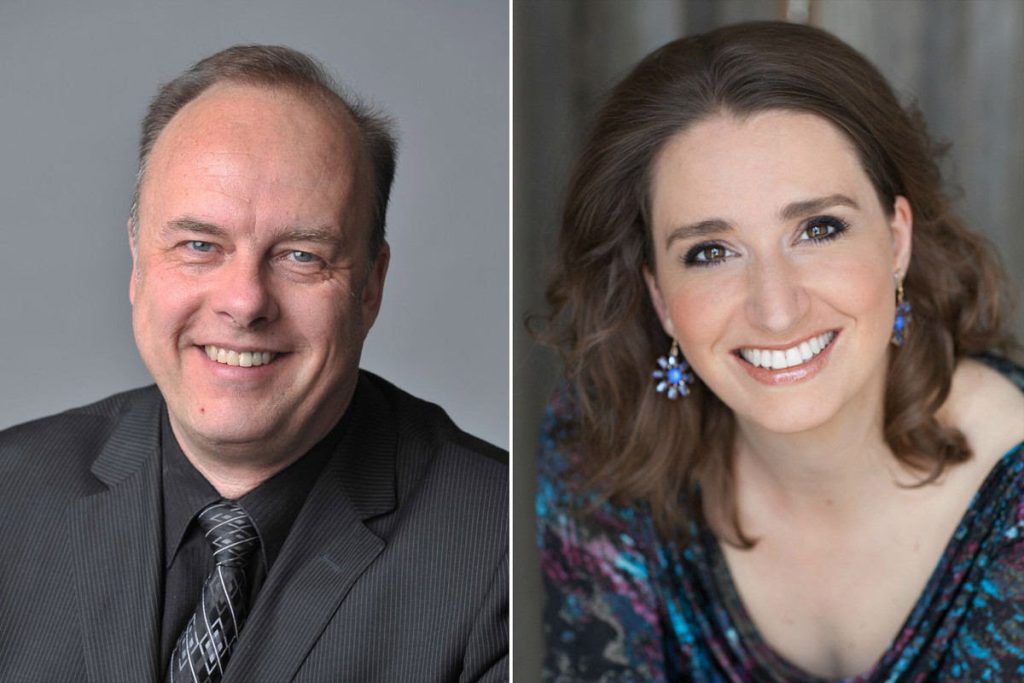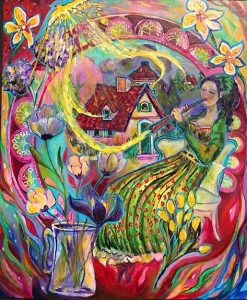
Blessed by Bach: A Musical Marriage
Music Comes First
In every household, the trash must be taken out, dishes cleaned, beds made, and laundry washed. But in the Alltop-Stoppelenburg household, one thing comes before everything else… music. For this is a musical marriage: two souls that have joined together thanks to the power and particulars of the art form.
Soprano Josefien Stoppelenburg had to travel from her family home in the Netherlands to supply her half of the union. After studying at the Conservatorium van Amsterdam, she spent four years working in Cologne, Germany, before coming to the United States for what was meant to be one year. “Then I met Stephen, and I’m still here.”
Finding a Balance
She balances a national and international performing and teaching career with her life in Chicago with Alltop. In 2021 Navona Records released her CD, “Modern Muses, Contemporary Treasures for Soprano and Cello” performed in collaboration with cellist Jean Hatmaker. The album won a Bronze Medal at the 2022 Global Music Awards.

And just to be sure she has no significant “downtime,” Josefien is also a professional painter who recently illustrated a children’s book (http://www.josefienstoppelenburg-art.com).
A Musical Institution Unto Himself
Conductor and keyboard artist Stephen Alltop is a musical institution unto himself in the greater Chicago area. Stephen grew up in Phoenix and studied organ and conducting at the Eastman School of Music. He earned his doctorate in orchestral conducting from Northwestern University, where he is currently on the conducting faculty of the Henry and Leigh Bienen School of Music and director of music at Alice Millar Chapel. He has also presented over 100 lectures for Northwestern’s continuing education programs. Stephen also serves as music director and conductor of the Apollo Chorus of Chicago, the Champaign-Urbana Symphony Orchestra, and the Elmhurst Symphony Orchestra.
At the time of this interview, Josefien had just arrived from Houston, where she had performed with two of the region’s Baroque ensembles, ARS Lyrica and the recently minted Harmonia Stellarum Houston. “It was a delight,” she said. Back in Chicago, Stephen said he had been immersed in a project for Cedille Records – the world premiere recording of Terra Nostra, an oratorio by the couple’s favorite contemporary composer, Stacey Garrop.
David Sckolnik: How did you two meet?
Josefien: Through music, really. Because I was new to the country, I reached out to a lot of musicians to see if we could collaborate at some point. And then someone said, “You need to meet Stephen Alltop because he does a little Baroque music like you do.” And then we met and quickly became very good friends. We both were hired by a group in Chicago called Music of the Baroque and we loved performing together. At some point it was a little more than friendship and we’ve been married for just over ten years.
Stephen: In truth, she pursued me relentlessly.
David: Was there a moment when you knew this was a real thing?
Josefien: I was in a production and Stephen was conducting. The combination of him being such a good musician and radiating and infusing the musicians with such joy, that really gave me the happy chills, if that makes sense.
David: Is there a composer who shares the marriage with you?
Stephen: There are a bunch of them in here with us. And the cool thing is they’re not all men. There are a bunch of women in here, too. From the 17th, 18th, all the way through the 20th century — they’re here all the time.
David: Who are the stars — the composers you find the most common love, common ground with?
Stephen: There’s not a day that goes by that we don’t do some music by Bach and Handel. We also adore the music of Stacey Garrop, who has written pieces for us and whose music we perform very frequently. We adore Monteverdi as well.
David: Is there a special energy when you are performing together, whether Stephen is on a keyboard or conducting?
Josefien: Absolutely. Every time we make music together, we comment that it feels so natural. We feel each other very closely and it feels so easy.
Stephen: It’s really palpable. We both notice it all the time. There’s this feeling of a hand in glove, a perfect fit… I love watching Josefien perform. My only regret when I’m either playing or conducting is that I can’t just sit there and watch her because she’s so expressive and engages audiences more than any other singer I’ve ever seen.
David: So it’s safe to say music dominates your lives?
Josefien: I sometimes say we have a ménage à trois, which is Stephen, Josefien and music. Actually, I also paint — that’s my second life. So maybe it’s a ménage à quatre.
Stephen: The other thing that’s special to both of us, that involves both of us frequently is public speaking. I do a great deal of speaking about music and I really enjoy that. I’ve always been passionate about a) learning new things which these presentations cause me to do, and b) what is so amazing about the history of music and music itself.
David: I’m glad you mentioned how important Bach is to your lives because I have some questions about your upcoming Bach Birthday Party that you’ve put together for a Guarneri Hall concert. First — how did it come about?
Stephen: I’ve had the pleasure of performing and recording at Guarneri Hall several times. I’ve worked with [Artistic Director] Stefan Hersh for years, greatly respect him as a musician, and now he’s also a great facilitator for music in Chicago. Josefien and I have a bit of history performing Bach on his birthday — it’s a sacred day in our household. So, he invited us to put together a program, pretty easy when it comes to Bach. Making a nice program with string quartet, flute, soprano and harpsichord. We could not be more excited about the music that we’re doing.
David: Is there a rhyme or reason to the program you’ve selected?
Stephen: We wanted to show some different aspects of Bach. So the program begins with a gorgeous Sinfonia from a Cantata (No. 196) and ends in a secular Cantata in Italian (No. 209) which is pretty rare.
David: Are you using authentic, period instruments?
Stephen: We’re using modern instruments, flute and string quartet with harpsichord and Josefien, soprano. But we’ll be using a lot of performance practice style [from the Baroque].
Josefien: I’m an authentic instrument.
Stephen: You are an original.
David: You haven’t changed much over the centuries, Josefien. You’re still pretty much what you were in Bach’s day. What are you hoping the audience will take away from the concert?
Josefien: It’s a wonderful program with a celebration vibe. It’s very bubbly, satisfying music. I hope people go away with a joyful feeling of Bach. We really picked some beautifully sparky moving pieces.
Stephen: There’s a lot of variety but in terms of how they’ll go away, that last movement of Cantata 209 is one of the most joyful pieces of Bach. So they always leave dancing.
David: Finally, what would make up the perfect Bach birthday cake?
Josefien: He had so many children so maybe one with about four layers, so everyone could have a piece.
Stephen: We might put in some oysters because they’re associated with fertility. It could have a little seasoning of both salt and sugar since Bach’s music runs the gamut in terms of emotional expression. Knowing Bach, it would be eight different cakes perfectly structured to make a perfectly symmetrical form emblematic of the Age of Enlightenment.
Josefien: It would have to be a coffee cake because, in his time, coffee was so popular.
David: It does seem a shame that such an exciting program as this will be one and done.
Stephen: I look at it in a slightly different way. Every work on this concert represents old friends that we have had the occasion to perform, sometimes, many times. I don’t look at it as an isolated event. I look at it as another step in a very long journey.

